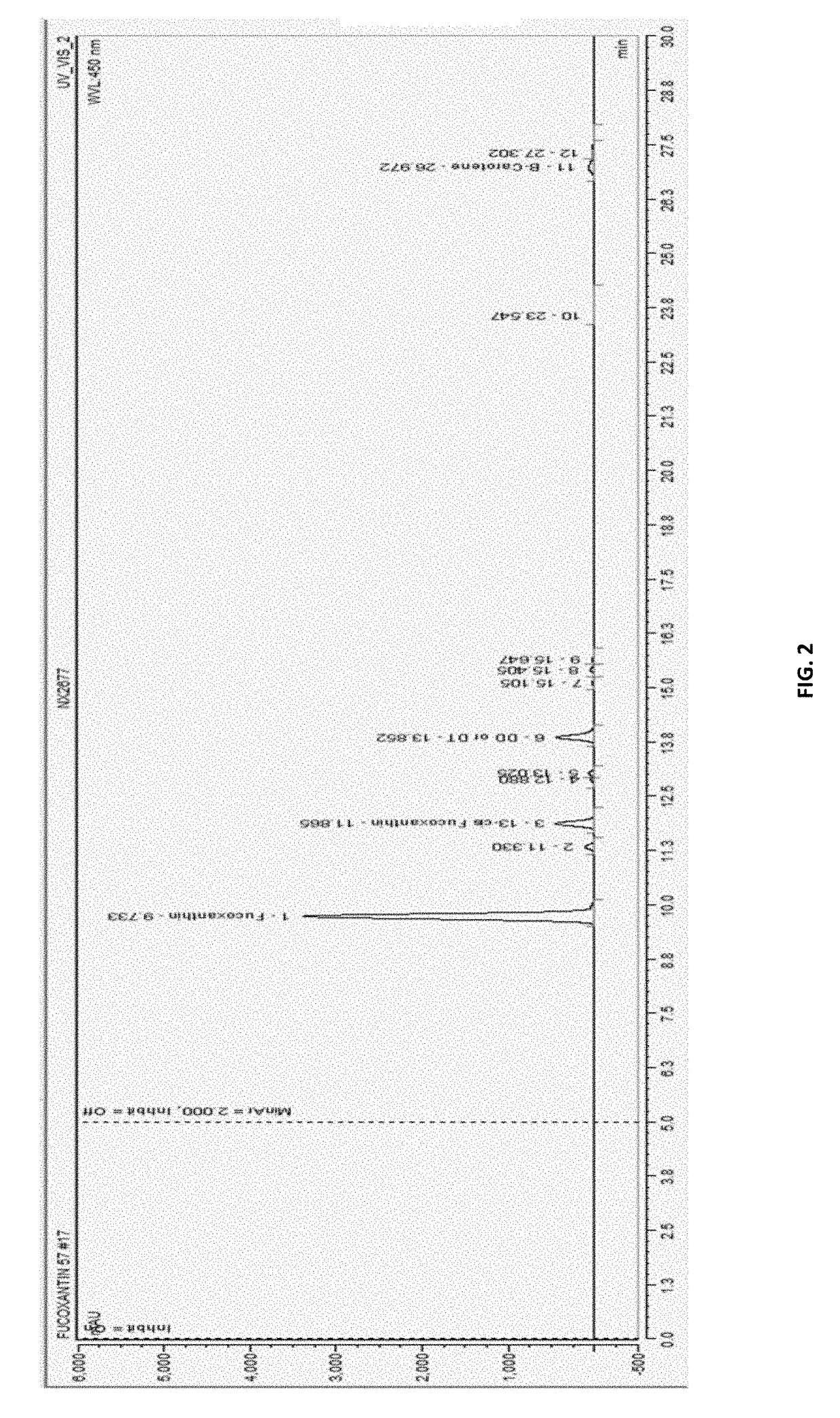Compositions comprising carotenoids and use thereof
a technology of carotenoids and compositions, applied in algae medical ingredients, anti-noxious agents, metabolic disorders, etc., can solve problems such as the challenge of extracting fucoxanthin, and achieve the effect of low saccharide levels and high carotenoids
- Summary
- Abstract
- Description
- Claims
- Application Information
AI Technical Summary
Benefits of technology
Problems solved by technology
Method used
Image
Examples
example 1
Effect of Nitrogen Source on Fucoxanthin Accumulation in P. tricornutum Microalgae
[0122]P. tricornutum microalgae were cultivated for 3 days, on day 3, nitrogen was added in the form of KNO3 or urea (CH4N2O) alternatively. The content of fucoxanthin was determined by HPLC on three time points. Result show that when cells are grown in the presence of 0.5 g / liter urea the percent of fucoxanthin by dry weight of the biomass (also referred to as dry weight % / DW) is increased.
TABLE 1Effect of nitrate on Fucoxanthin productionFucoxanthin [% / DW]day 3day 6day 8No additional1.240.960.77nitrogenKNO31.251.31.26Urea1.291.541.6
example 2
Effect of Salt Concentration on Fatty Acid Accumulation in P. tricornutum Microalgae
[0123]P. tricornutum microalgae were cultivated in the presence of different concentrations of sodium chloride (NaCl). Results show that when sodium chloride concentration in the medium was reduced from 27 g / liter to 9 g / liter the percentage of PA, AA, DPA, DHA and EPA from total fatty acid was increased (see table 2).
TABLE 2Effect of sodium chloride on total fatty acids (TFA) accumulation NaCl concentrationFatty acidUnits9 gram / Liter27 gram / LiterPalmitoleic acid% / TFA19.417.2% / DW2.52.6AA% / TFA3.52.3% / DW0.50.3EPA% / TFA2620.5% / DW3.43.1DPA% / TFA3.32.5% / DW0.40.4DHA% / TFA1.20.2% / DW0.80.1TFA% / DW13.115.2
example 3
Biomass Content of P. tricornutum Microalgae
[0124]P. tricornutum microalgae were cultivated and harvested. The biomass content was examined by HPLC. A HPLC spectrum of the extract recorded at 450 nm is shown in FIG. 1.
[0125]The biomass content was analyzed and the calculated content in dry biomass is summarized in table 3.
TABLE 3P. tricornutum microalgae biomass contentunitsValueUnitsValueFuco% / DW1.7-2Total Fatty Acids / DW% / DW14.5C12:0 Laurie acid% / total4-5% / DW0.03fatC14:0 Myristic acid% / total12.2% / DW1.04fatC16:0 Palmitic acid% / total0.2% / DW1.52fatC16:1 Palmitoleic acid + % / total7.2% / DW3.10isomeresfatC16:3 Hexadecatrienoic acid % / total0.3% / DW2.25(HTA)fatC18:0 Stearic acid% / total17.6% / DW0.03fatC18:1-19 Oleic acid% / total21.3% / DW0.06fatC18:2cis / trans% / total0.6% / DW0.01fatC18:2 Linoleic acid% / total7.3% / DW0.23fatC18:3 Alpha Linolenic acid% / total1.1% / DW0.10fatC18:3 gamma-linolenic acid% / total2.1% / DW0.04fatC18:4 Octadecatetraenic acid% / total0.1% / DW0.09fatC20:0 Arachidic acid% / total4.4% / DW0.06...
PUM
| Property | Measurement | Unit |
|---|---|---|
| temperature | aaaaa | aaaaa |
| pH | aaaaa | aaaaa |
| concentration | aaaaa | aaaaa |
Abstract
Description
Claims
Application Information
 Login to View More
Login to View More - R&D
- Intellectual Property
- Life Sciences
- Materials
- Tech Scout
- Unparalleled Data Quality
- Higher Quality Content
- 60% Fewer Hallucinations
Browse by: Latest US Patents, China's latest patents, Technical Efficacy Thesaurus, Application Domain, Technology Topic, Popular Technical Reports.
© 2025 PatSnap. All rights reserved.Legal|Privacy policy|Modern Slavery Act Transparency Statement|Sitemap|About US| Contact US: help@patsnap.com


